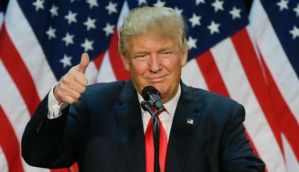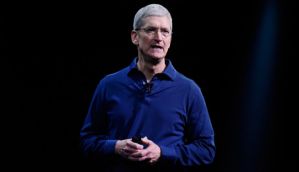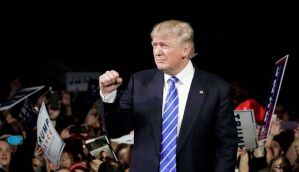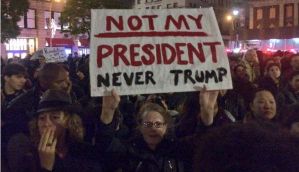
Businessman Donald Trump, belying most predictions, will take over as the next president of the United States on 20 January, 2017.
The result of the keenly contested polls, which could drastically change the direction of America's foreign policy, has evoked mixed reactions from global leaders. While Russia has welcomed the move, a Donald Trump presidency has made Seoul anxious despite Trump promising to "deal fairly with everyone - all people and all other nations."
The Russian reaction
With the United States and Russia virtually headed towards a cold war 2.0 situation after deep fissures over issues like Syria after the ceasefire agreement was violated, and Ukraine, President Vladimir Putin, sent a congratulatory telegram to President-elect Trump.
"In a telegram, Putin expressed hope toward joint work to lift Russian-US relations from the state of crisis, as well as to address the pressing issues of the international agenda and the search for effective responses to global security challenges," Kremlin said in a statement.
Also read - If Hillary wins, or if Trump wins, it'll be a wake up call for hate politics either way
The last few months had seen a sharp dip in the bilateral ties between the two major powers. The Democrats, who lost the presidential race, even went to the extent of calling the Wikileaks expose on Hillary Clinton's emails a Russian conspiracy and accused the Kremlin of cyber attacks to interfere in the elections.
"The US Intelligence Community is confident that the Russian Government directed the recent compromises of e-mails from US persons and institutions, including from US political organizations," said a joint statement from the two agencies. ". . . These thefts and disclosures are intended to interfere with the U.S. election process," Director of National Intelligence and Homeland Security said in a statement then. The US had vowed retaliation.
"Is the US some kind of banana republic? The US is a great power," Putin took a dig then.
Trump had indicated lesser US adventurism, especially after the debacle in Libya and Syria, where the Russians have been blaming the US for shoring up terror outfits in the garb of supporting democratic movements.
An anxious Seoul
Meanwhile, in Seoul, there is anxiety. The markets plummeted after the announcement of Trump's win. Big South Korean players like Samsung, Hyundai and major exporters fear trade protectionism by the new president could hurt their interests.
Trump had also attacked South Korea for not sharing the military costs, threatening to pull out the American troops, and had indicated talks with the North, while advocating that Seoul could build its own nuclear arsenal.
Trump, who called North Korea's Kim Jong a 'maniac', 'total nutjob' and a 'madman playing with nukes' believes North Korea is more of a problem for China then the US and that he would get the Chinese to solve it. "ISIS is a big problem, Russia's a problem, China's a problem. We've got a lot of problems. By the way, the maniac in North Korea is a problem. He actually has nuclear weapons, right? That's a problem," Trump had said in a campaign speech in South Carolina.
South Korean Foreign Minister South Korean Foreign Minister Yun Byung-se hoped that the new administration would continue with the policies of pressuring North Korea over its nuclear and missile programmes. "Trump has indicated that the greatest problem facing the world is the nuclear threat and members of his national security team hold the position that favor's applying strong pressure against the North," Reuters quoted Yun.
Japan's overture
With Trump promising to rework how the US carries on business with East Asian countries including its two important allies, the South Korea and Japan, Shinzo Abe, the Japanese Prime Minister, will be sending a special envoy next week to interact with the new administration. "We have been preparing so that we can respond to any situation because our stance is that our alliance with the US remains to be the cornerstone of our diplomacy whoever becomes the next president," Katsuyuki Kawai, a political aide to Prime Minister Abe was quoted as saying.
China's stake
Meanwhile, it is China, which could emerge as the biggest benefactor if Trump implements the protectionism and isolationism, he promised during the campaign.
Chinese state media said President Xi Jinping had called Trump to congratulate him on his victory.
"I place great importance on the China-US relationship, and look forward to working with you to uphold the principles of non-conflict, non-confrontation, mutual respect and win-win cooperation," Xi was reported to have told Trump. Xi also told Trump he hoped the two sides could avoid "conflict and confrontation [and] instead achieve cooperation and a win-win [relationship]".
Withdrawing from the Trans Pacific Pact by the US would help the Chinese push their goods. The shifting geo-strategic alliances too could benefit the Chinese, especially in the face of the ongoing dispute over the South China Sea. This is perhaps why a lot of American publications, including the Foreign Policy Magazine and the Wall Street Journal are arguing how a Trump win is actually a win for Beijing.
However, Foreign Ministry Spokesperson of the Chinese Government was measured. "China said Wednesday it expected to make joint efforts with the new US government to maintain sustained, healthy and stable growth of China-US relations, and benefit people of the two countries and the world, the Global Times quoted Lu Kang as saying in the routine press briefing.
Edited by Aleesha Matharu
More in Catch - US elections: India-US ties may not change dramatically even if Trump wins
Lessons for democracy and common sense from the 2016 US elections
First published: 9 November 2016, 7:43 IST





![BJP's Kapil Mishra recreates Shankar Mahadevan’s ‘Breathless’ song to highlight Delhi pollution [WATCH] BJP's Kapil Mishra recreates Shankar Mahadevan’s ‘Breathless’ song to highlight Delhi pollution [WATCH]](https://images.catchnews.com/upload/2022/11/03/kapil-mishra_240884_300x172.png)

![Anupam Kher shares pictures of his toned body on 67th birthday [MUST SEE] Anupam Kher shares pictures of his toned body on 67th birthday [MUST SEE]](https://images.catchnews.com/upload/2022/03/07/Anupam_kher_231145_300x172.jpg)






